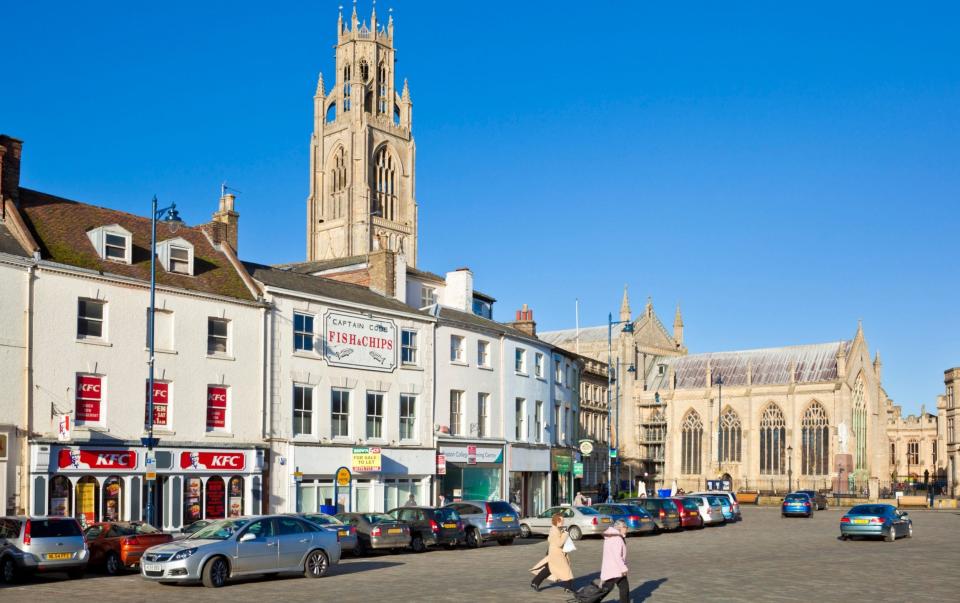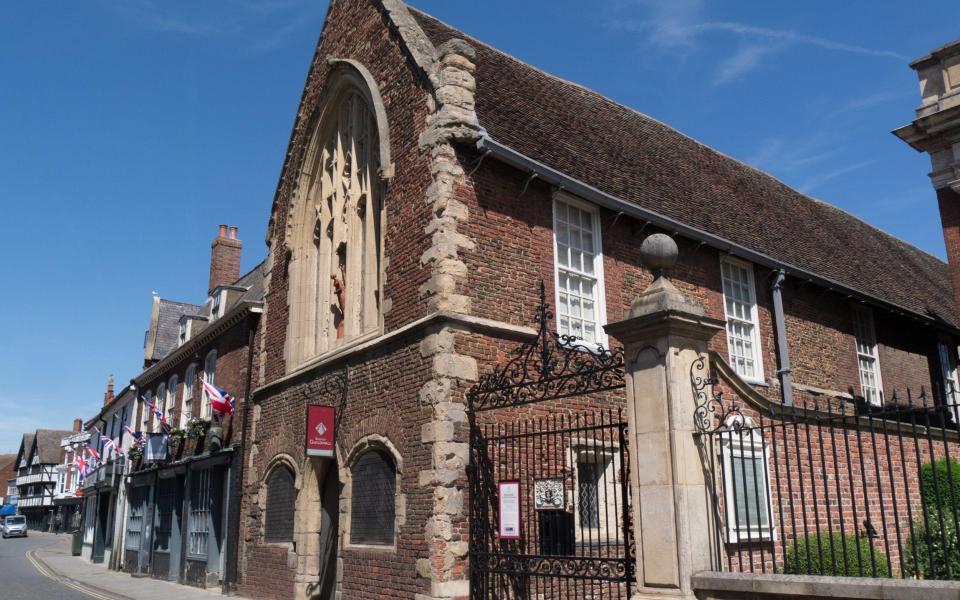How a Lincolnshire town – rich in history but Britain’s poorest – is turning things around

I wonder if Carol Emerson is trying to bribe me. The hamper she’s provided is cornucopian, with enough local produce to feed a family: Mountain’s Boston Sausages, Lincolnshire Poacher cheese, Myers Plum Loaf, Hawkens Grantham Gingerbread, honey from the hives on her fourth-generation farm.
“Boston gets a bit of a bad name,” she says as we sit in Elm Farm’s old stable blocks – now sustainability-focused holiday cottages – on the town’s outskirts. “But this area has so much to offer. There’s a lot of history. Lovely big skies. Cycling. RSPB reserves.” And mouthwatering sausages, let’s not forget those. “It’s half the price of more touristy places too,” she adds.
Carol is a passionate advocate for this maligned corner of Lincolnshire. But I will not be swayed (much) by a full fridge. I head into Boston to check it out myself.
Carol isn’t wrong about the history. Boston, strategically located where the River Witham meets the North Sea, got rich on the wool trade. It was part of the Hanseatic League and second only to London as a port during the medieval period. This historic wealth is evident in many of its buildings: the Queen Anne finery of Fydell House, the 14th-century Guildhall and, looming head, shoulders and lantern-topped tower above everything for miles of fenland flats, St Botolph’s Church – aka “the Stump”.

But lately the town has fallen on harder times, garnering the wrong headlines for its low wages, high immigration but lack of integration, crime and obesity. The grand Victorian Scala Theatre – where music hall act Old Mother Riley started his/her career – was, until recently, a Poundstretcher. But change is afoot. The town has received a large amount of funding to help revive its high street and invest in its heritage. And it has something specific to aim towards.
The Pilgrim Fathers’ journey began in Boston. In 1607 these Puritan separatists from the surrounding countryside tried to escape persecution by sailing to Holland. They were caught – a lonely memorial, a few miles seaward of town, marks the spot – and imprisoned briefly in the Guildhall. They finally made it to Holland, and then the USA, aboard the Mayflower, in 1620.
“They’re the famous ones – and the ringleaders were kept in these cells,” says Boston Council’s David Worthington as he leads me around the venerable Guildhall. “But the bigger story is the Cotton congregation, who went and founded Boston, Massachusetts, in 1630. People get them muddled. Hopefully the 400th anniversary will put things right.”
Yes, Boston 2030 might be seven years away, but it’s already a big deal. The plan is to launch it officially later in 2023 and then work gradually and thoughtfully towards it, building local pride, improving living standards and getting the message out that Boston UK is worth a visit.

Boston-born guide Jane Keightley is showing me around. She’s knowledgeable, fun and her tours are a steal at £5. As we poke around the marketplace and narrow alleys, she tells me more about John Cotton, the charismatic preacher, Puritan and one-time Reverend of St Botolph’s who was so integral to the colonising of Massachusetts. She also takes me to the theatre.
“There used to be four friaries in medieval Boston,” Jane explains, “but Blackfriars is all we’ve got left. In the 1950s it was crumbling away, but some am-dram societies raised money, and got an architect to design a theatre to fit into what was left.”
Blackfriars is intimate and ingenious, with a modern ventilation system, lift, 224-seat auditorium and retro 70s bar somehow fitted in and around bits of 13th-century walls. It’s also doing good things. “Boston has a wide range of ethnicities, and we want to increase the diversity of our programming,” says venue manager Andrea Townshend. “We’re trying to build a community space.” Prices are reasonable too – “we’ve not broken £30 yet!”. While there is negativity, Andrea notes, “a lot of people feel very passionately about Boston. I think we’re on the right track.”
Someone who’d agree wholeheartedly is Adam Kelk, St Botolph’s head verger and a force of nature. I meet Adam in this ludicrously impressive church, which was built from 1309 to serve the flourishing port. I’m taken aback by the immensity of the nave, the audacity of the 81m-high tower and the significance of the pulpit, the very one used by John Cotton to deliver his inspirational sermons.

But it’s Adam, and the boldness of what this historic space is doing, that’s most impressive. As we sit in the cafe, built into the space beneath the soaring tower, Adam tells me about some of the events held at the Stump. These range from Boston Sinfonia concerts to Bollywood nights, mental health cafes to Lego club, trapeze artists to Northern Soul DJ nights.
“We’re first and foremost a place of worship,” says Adam. “But we do work to bring people in who wouldn’t otherwise come. Sense of place is important. The more we can get communities to experience that, the more pride people will have in living here.”
There used to be some kickback against the Stump hosting these sorts of things, he says, but now the benefits are seen. “We were looking at bankruptcy. We had to find a new way of being a church.”
Like the Pilgrim Fathers who had the vision and courage to strike out for new lands, so the Stump is taking pioneering steps – to both survive and to reflect the town that it serves. That’s worth celebrating.
Boston essentials
Elms Farm offers self-catering cottages in converted stables, sleeping two to six; from £750 per week.
Jane Keightley runs Boston History Tours; 10.30am Wednesdays plus bespoke options, from £5pp.
The Guildhall Museum is open Wednesday-Saturday; free.
Blackfriars Theatre & Arts Centre offers a varied programme.
St Botolph’s is free to enter (donations welcomed); tower climbs £5.
See destinationlincolnshire.co.uk for more information.

 Yahoo Sports
Yahoo Sports 